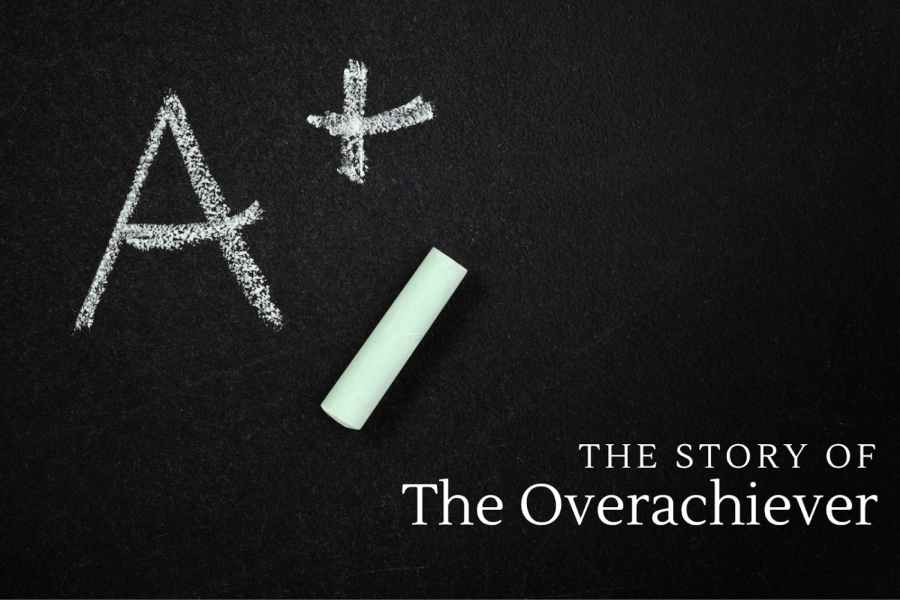The story of the overachiever
Graphic designed by Nimrah Khan via Canva
The education system glorifies the notion of overachieving and being the absolute best. But to what extent?
Nowadays, stepping onto a high school campus is like climbing into a boxing ring. With the constant pressure to be the best, it’s no surprise that the pressures of school can stress students out. Though there is a particular group of students that the education system glorifies: the overachievers.
These are the students with their lives seemingly put together: a 4.5 GPA, several AP classes, countless extracurriculars, involvement in the student body and community, applications to top colleges, high class ranking, and the list goes on.
Many argue that a competitive school system produces driven students who are active in society and the economy. However, that is simply not true, and the overachiever is the perfect example.
Rachel Kaplan, an 18-year-old college student, shared her struggles with competition in high school. According to her article on Medium, an online publication, Kaplan succeeded academically growing up, receiving straight As year after year. However, life happened, and she ended her sophomore year with a 3.42 GPA instead of a 4.0 GPA. As the ‘overachiever,’ she was devastated.
[sno-infographic id=”3189″ align=”left”]
“That one semester of my life, when I was fifteen years old, dictated my educational future. I will not get into Ivy League schools. I will not get into many schools,” Kaplan wrote in her article “Why Do We Pressure High Schoolers To Be Overachievers?”
Several RCHS AP students reflect that same mindset and suffer from it.
Out of 36 RCHS AP students surveyed, nearly 80% of students admitted feeling pressured to be the best. Moreover, about 77% have at least a 4.0 GPA, but over half agree that their GPA could be better. According to the survey, only 3.7% of students were completely satisfied with their high GPA. `
“They teach us college is how you become successful, and I simply don’t believe that not having a degree makes you a failure,” RCHS senior Keilany Turr said. “School has had mostly an impact on my mental health. Over time I’ve just learned it’s not going to be long-term for me.”
Many students also feel burned out after putting in so much effort to compete with others academically.
Senior Hyemi Choi said, “It has honestly burned me out quite a few times until I stopped caring.”
According to Veronica Raggi, Ph.D., many of today’s teenage overachievers fall into the category of “maladaptive perfectionists,” students who—combined with the pressure and expectations outside the classroom—learn to fear failure intrinsically while setting high expectations and unachievable goals.
And where does this all start? Competition in schools.
In a study conducted by the National Bureau of Economic Research (NBER), researchers found a strikingly high correlation between youth suicide rates and in-person school attendance.
[sno-infographic id=”3194″ align=”right”]
“The results, consistent with those of Hansen and Lang (2011), show that youth suicides decline in summer months and in December, times when students are generally not attending K-12 schools,” researchers Benjamin Hansen, Joseph Sabia, and Jessamyn Schaller wrote in the study.
Schools are supposed to be safe learning environments. However, the statistical evidence presented by the NBER strongly suggests that the school year factors into teen suicide rates.
“I feel as though everyone is trying to be the best, and as time goes on, there is always one student who is setting the standard higher,” Choi said.
By pitting students against each other with GPAs and class rankings, school competition culture destroys education and drags teens down the depressive cycle of perfectionism. Hence, one can attribute the rise of teen suicide during the school year to increasing levels of academic competition.
RCHS senior Caria Sefiane said, “Since I do very well in school, I tend to feel like a failure when I am critiqued, so school has pretty much given me a false reality of what success or failure are.”
Moreover, the American Psychological Association (APA) released a scientific journal discussing the increasing perfectionism among students since 1989.
Ph.D. authors Thomas Curren and Andrew P. Hill conducted several observational studies on high school and college students and wrote articles touching on the various dimensions of perfectionism and its effects.
Among many notable discoveries, Curren and Hill concluded that high school students’ expectations have indeed risen to unrealistic heights.
“In the United States, where cohort data is available, approximately half of high school seniors in 1976 expected to attain at least some college degree, by 2008 that figure had risen to over 80% (Jacob & Wilder, 2011). Yet actual degree attainment has failed to keep pace with rising expectations,” Hill and Curren wrote.
[sno-infographic id=”3201″ align=”center”]
The article also comments on teens’ academic expectations.
“Together, this research suggests that the expectations of many young people are increasingly unrealistic (Baird, Burge, & Reynolds, 2008). As young people’s expectations have increased, so have the educational demands placed on them,” Hill and Current wrote in their study.
Yes, competition motivates students to do their absolute best. AP exams exemplify the notion that a student must simply outperform their classmates to succeed. Amidst all the high-stake testing, students are so busy surpassing their peers instead of being human.
It seems as though the teenage psyche has completely evolved from living life to the fullest to surpassing everyone else and succeeding in the future as soon as possible. Why should today’s teens live like that?
Alexandra Robbins’ non-fiction novel The Overachievers: The Secret Lives of Driven Kids. is a commentary on the educational system that demonstrates a deeper perspective on unhealthy competitive school culture through the biographical and anecdotal accounts of overachieving students.
The novel follows the lives of 4 juniors in high school, each with distinct personalities and cliques, who struggle through life while carrying the weight of extreme expectations. As overachieving students, many parents, teachers, and other students expect them to go beyond excelling. The constant pressure to be the best and to uphold their expectations ultimately causes the students issues including anxiety, stress-related hair loss, and depression. According to Wharton, a publication run by the University of Pennsylvania, the novel forces its audience to reflect on the stressful, over-scheduled lives of students living in a culture that excessively emphasizes achievement.
Journalist Jen Doll brought up a good point in response to a trend of high schoolers graduating in less than four years.
In her article titled “Overachieving High School Students Can’t Stop Overachieving,” she said, “Isn’t senioritis, like detention, like skipping class to…hang out in the parking lot, like learning from your mistakes and growing up all in due time, something we should all get to experience? Are we just speeding kids through life now?”
Overachieving students take on more responsibilities, harder classes, bigger extracurricular activities, and even more volunteer opportunities, seemingly never satisfied with their place in life.
What makes this a problem is exactly what Doll mentioned, the absence of time for learning and growth that accompanies the teenage years. Many times, this results in fear of rejection and failure, especially for overachieving students who have never experienced that before and already operate under intense pressure.
After graduation, it is thought that students who have adapted to intense competitive culture within schools can reflect that within their professional lives, and thus thrive in their careers.
If that mindset seeps into one’s personal life, it could jeopardize one’s humanity.
Everyone falls into this trap.
“I am very incredibly afraid of failure and school definitely contributed to that,” Sefiane said. “It is my own need to have straight A’s…to an extent because of adult validation.”

Nimrah Khan is a senior at RCHS, and this is her third year in journalism. She is the editor-in-chief of the school newspaper, The Cat’s Eye. Her favorite...






